Group B Streptococcus claims for medical negligence seek compensation for a missed diagnosis of Group B Streptococcus, which damages your baby. If your child suffers a Group B Streptococcus infection after birth, you might have a claim for medical negligence compensation.
If you carry the Group B Streptococcus bacteria, you can transfer it to your baby at birth. You should be tested for Group B Streptococcus in your final trimester and treated with antibiotics if one is found. A Group B Streptococcus infection can carry risks of a birth injury to your newborn.
If you are not treated for Group B Streptococcus and your newborn contracts the disease, you may have a claim for medical negligence.
A No Win No Fee medical negligence solicitor handles your Group B Streptococcus claim and wins you the compensation you deserve.
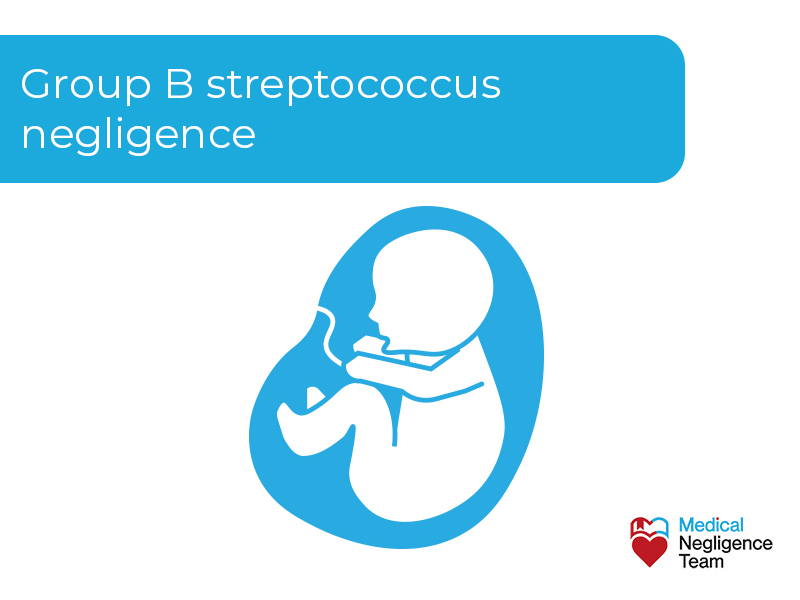
Table of content
What is Group B Streptococcus?
Group B Streptococcus is a bacteria carried by many adults though it is harmless to most people. The problem with Group B Streptococcus is that it can harm your newborn baby, and it is easy for you to infect the baby if you carry Group B Streptococcus.
Group B Streptococcus is also known as Group B Strep or GBS. It is harmless to adults but can cause Group B Strep in babies. GBS can also be harmful to seriously ill adults and the elderly.
The Group B Streptococcus bacteria live in the vagina and bottom area and can be transmitted to a baby during birth. Most babies can recover after a course of antibiotics, but there are risks involved that may do serious harm to your baby.
What are the risks of Group B Streptococcus negligence?
The risks of Group B Streptococcus range from mild infection to some very serious diseases that could become lifelong conditions. Your obstetrician and the maternity team at the hospital should test you for the Group B Streptococcus bacteria to minimise the risks to your baby.
Some of the risks of Group B Streptococcus to a newborn baby:
The risks of Group B Streptococcus are many to a newborn baby though they are easily avoidable.
If your child contracts Group B Streptococcus and suffers ill health, you might be able to start a Group B Streptococcus negligence claim.
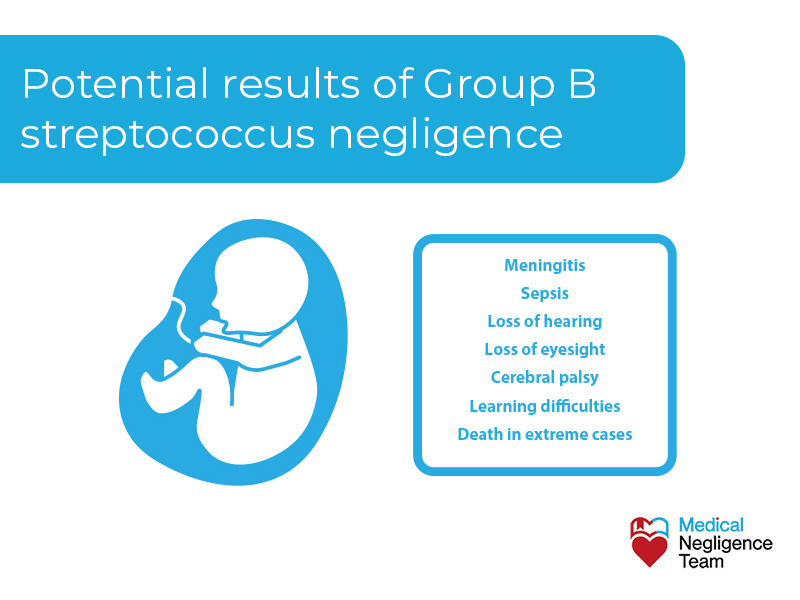
Common Group B Streptococcus claims for negligence
Common Group B Streptococcus claims for negligence deal with delays in treating a Group B Strep mother and the effects on the newborn baby.
The claims for negligence seek to get the family compensation for damage to the baby and also any long-term care costs.
Common Group B Streptococcus claims for negligence:
The risks of Group B Streptococcus are many to a newborn baby though they are easily avoidable.
If your child contracts Group B Streptococcus and suffers ill health, you might be able to start a Group B Streptococcus negligence claim.
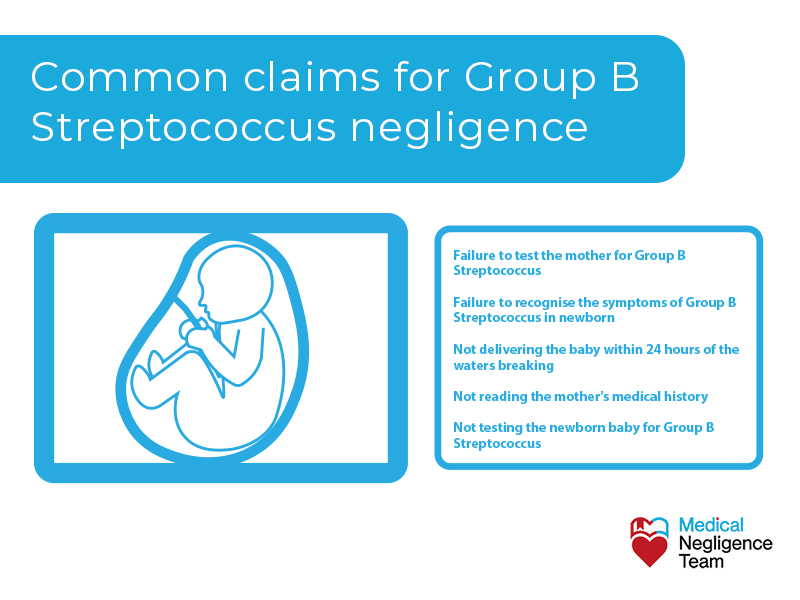
Failure to test the mother for Group B Streptococcus
Failure to test the mother for Group B Streptococcus can be medical negligence. If the mother has Group B, then the baby will be at risk of contracting GBS at birth.
A simple test for Streptococcus B can highlight the bacterial infection. The mother can be treated for it, precautions made for the birth and the newborn baby administered antibiotics.
Not testing the mother for Group B Streptococcus increases the risk for the baby and could be medical negligence.
Failure to recognise the symptoms of Group B Strep in a newborn
Failure to recognise the symptoms of Group B Strep in a newborn should never happen. Medical staff in the maternity ward are fully trained in recognising symptoms and diagnosing conditions. The dangers of Group B Streptococcus must be made known to all staff.
Symptoms of Group B Streptococcus in newborn babies are:
There are also clinical signs of Group B Strep, such as:
If your baby shows symptoms of Group B Streptococcus, medical staff should investigate and test for bacterial infection.
Not delivering the baby within 24 hours of the waters breaking
Not delivering the baby within 24 hours of the waters breaking increases the chances of the baby contracting Group B Streptococcus.
The unborn child will be vulnerable to infection in the womb, and Group B Strep is a very infectious bacteria, if the mother is carrying it.
Not reading the mother’s medical history
Not reading the mother’s medical history is a sure way to miss the signs of possible GBS infection and could be medical negligence.
If the mother has tested positive for Group B Strep in the past, it should be noted in her medical records. When the maternity team reads the notes, they can order and administer antibiotics to the newborn baby.
The sooner the Group B Strep is diagnosed and treated, the better it will be for the baby.
Not testing the newborn baby for Group B Streptococcus
Not testing the newborn baby for Group B Streptococcus can quickly make the GBS difficult to treat and put your baby at risk.
The newborn baby should be tested for Group B Strep if the mother has also tested positive. The baby should be tested if the mother had the infection in the past. If the baby is showing symptoms of Group B Streptococcus, they should be immediately tested.
Not testing the newborn for Group B Strep can be medical negligence if the baby is carrying the infection.
Compensation for Group B Streptococcus negligence claims
You can claim compensation for Group B Streptococcus negligence in amounts from the low £10,000s to over £1 million in some cases.
The compensation varies depending on several factors, and Group B Streptococcus claims sometimes see very high awards when conditions such as Cerebral Palsy develop in the baby. Amputation, hearing loss, and eyesight problems can be issues if the newborn baby develops Sepsis or Meningitis due to Group B Strep complications.
Compensation amounts in Group B Streptococcus negligence claims can be:
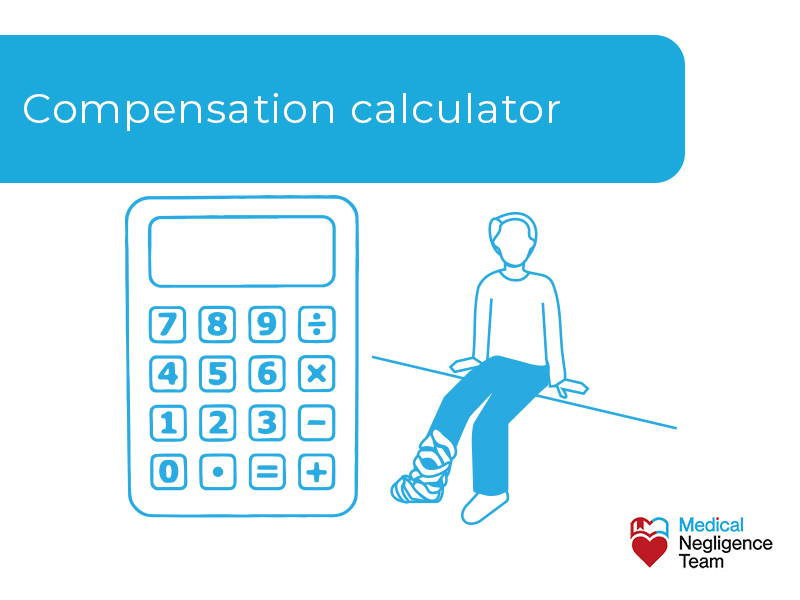
All amounts are approximate and are only a guide to what is possible in Group B Streptococcus negligence claims. Figures can be high in Group B Strep claims as your baby will need long-term care and could face medical bills for life. You claim for these care costs and the medical costs into the future.
As in all medical negligence claims, each case is dealt with on merit and how much your child suffers due to the Group B Streptococcus complications.
A No Win No Fee medical negligence solicitor will be the one to advise you on a Group B Streptococcus negligence claim. They will know from experience what your case may be worth and how to make a successful claim.
Your No Win No Fee medical negligence solicitor will handle your Group B Streptococcus negligence claim for compensation and for all damages incurred.
Our Process
Our team members have a higher career win rate with a 75% success rate on NHS letters of claim, compared to an industry average of 54.5%.
Enquiry
The first step is to get in touch and tell us what went wrong. It’s free and easy. Call our 24-hour helpline: 0800 246 1122 or request a callback here.
Medical Evaluation
Once you have spoken with our team we’ll let you know how we can help. Typically the next step is to obtain your medical records for us to review.
Legal Letter
Once all your medical records have been received they will be reviewed by a medically & legally qualified member of our team. If there is evidence of medical negligence we will send a letter of claim to the negligent party outlining your medical negligence claim.
What can you claim for when you sue for Group B Streptococcus negligence?
You can claim compensation for any damages that occurred when you sue for Group B Streptococcus negligence.
There are two types of compensation damages due when suing for any type of medical negligence: General damages and Special damages.
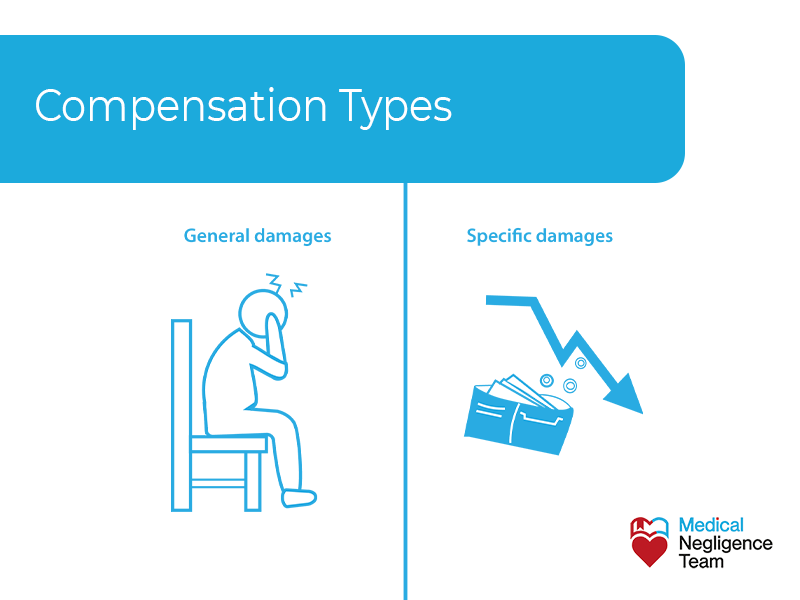
General damages
General damages are when you sue for the pain, suffering and loss of amenity, PSLA, you have experienced due to negligence.
Special damages
Special damages include loss of earnings, future care costs, and out-of-pocket expenses.
Be sure to keep payslips, receipts and proof of any losses you experience due to the medical negligence.
You deserve compensation to cover all losses, including loss of life, medical costs, and long-term care needs.
When you or a loved one suffers from the effects of Group B Streptococcus negligence, you make a claim for Group B Streptococcus negligence compensation.
Your No Win No Fee solicitor will guide you through the steps in making a Group B Streptococcus negligence claim.
Who is responsible for Group B Streptococcus negligence?
A medical professional is responsible for your Group B Streptococcus negligence. It could be the obstetrician who did not order a test for Group B Strep in your third trimester or the attending doctor who missed the signs of Group B Streptococcus in your sick baby.
The medical professional owes you a duty of care when dealing with your pregnancy and birth to ensure you have a healthy baby. Your baby may suffer from Group B Strep complications if the medical staff are negligent with that duty of care.
Medical negligence is treatment below an acceptable standard by a medical professional. Your baby may need to undergo years of treatment to deal with the effects of Group B Streptococcus infection.
By behaving less-than-professionally, the doctor risks the baby’s health, and the consequences could be with your child for life.
You can claim compensation for the Group B Streptococcus negligence and get the financial help to care for your child.
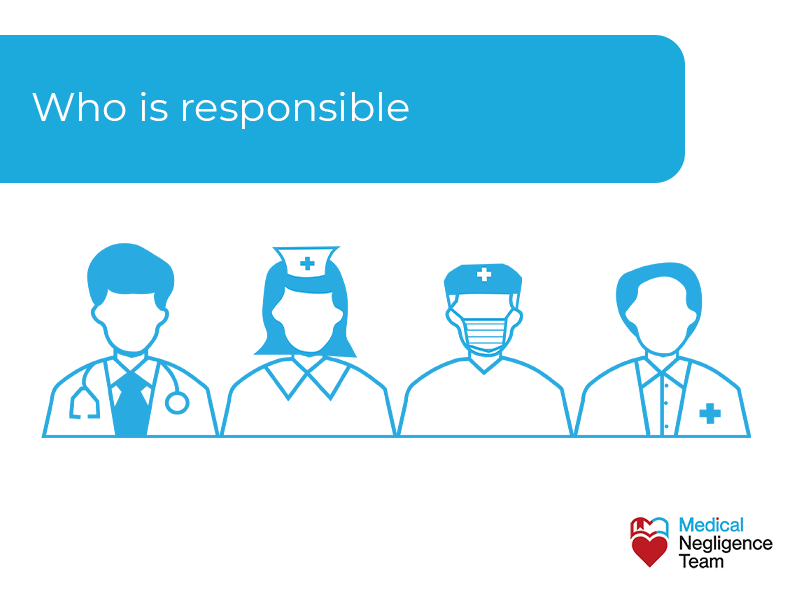
Clinical Negligence claims for Group B Streptococcus
Clinical negligence claims for Group B Streptococcus seek compensation for damages of the infection in your child. It is not always easy to prove clinical negligence as sometimes a baby will contract the infection, regardless of the precautions taken.
Your case for clinical negligence will rely on the care for the mother during pregnancy. Did the mother and baby receive care at a professional level, and were all tests carried out on time? If the answers are no, you could have a clinical negligence claim for compensation.
It may not be possible to avoid Group B Streptococcus infection in some cases, but steps should be made to make every effort in avoiding transmission to the newborn. If the mother has the Group B Strep infection, it is imperative for the maternity staff to test and monitor the newborn for it.
A No Win No Fee medical negligence solicitor can assess your case and make your claim for clinical negligence for Group B Strep compensation.
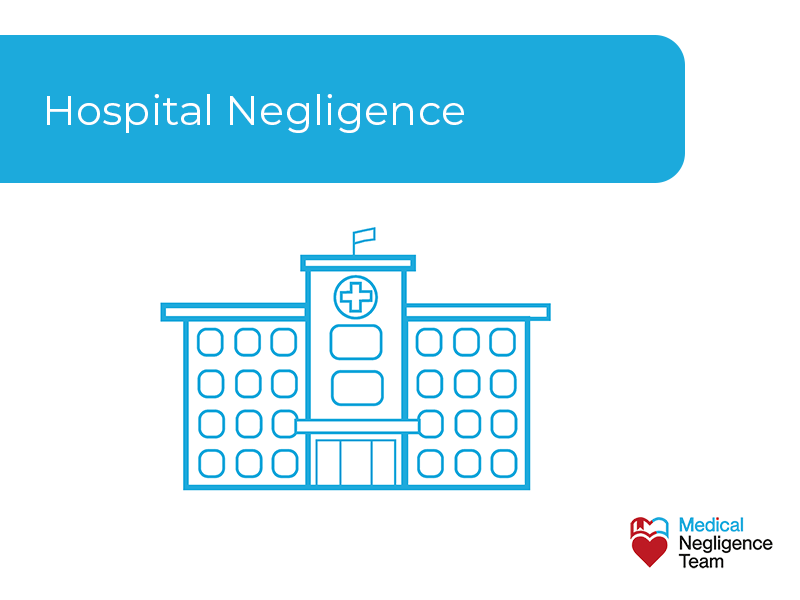
A fatal medical negligence claim
A fatal medical negligence claim is when a loved one dies due to the medical negligence of a medical professional. It could be the misdiagnosis of a condition leading to a worsening of symptoms and eventual death or not ordering tests to identify an infection.
Fatal medical negligence can happen when an attending doctor or obstetrician misses the signs of Group B Streptococcus. In some cases, it happens by failing to carry out tests or by not ordering a course of antibiotics.
Fatal medical negligence will have a devastating effect on those left behind. They will lose a loved one and all that entails, and the sorrow will be with the family for life.
You can make a medical negligence claim for compensation if you lose a loved one due to fatal medical negligence.
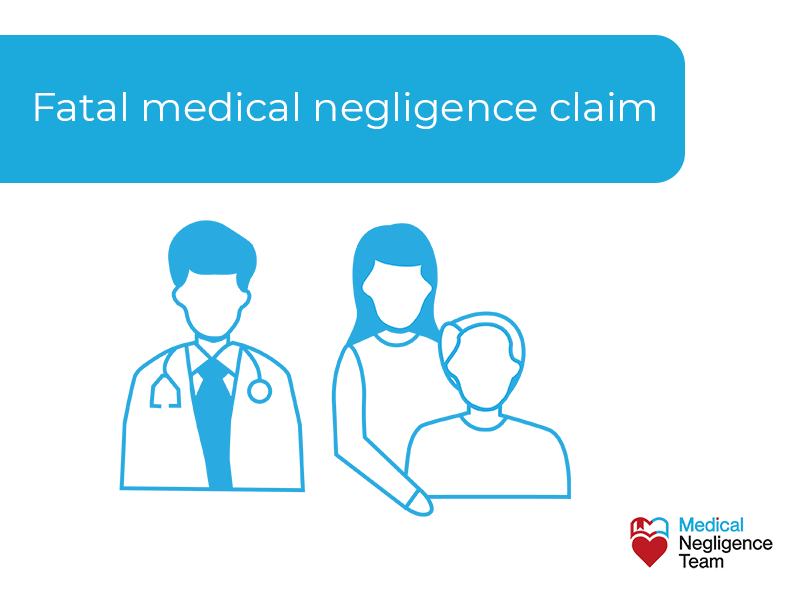
What are the steps involved in making a Group B Streptococcus negligence claim?
The steps involved in making a Group B Streptococcus negligence claim go from seeking medical advice to issuing court proceedings.
The steps are a part of any successful compensation case, and settlement can happen at any stage in the process.
Your medical negligence solicitor will do the rest when you follow the steps correctly and gather all the facts and figures.
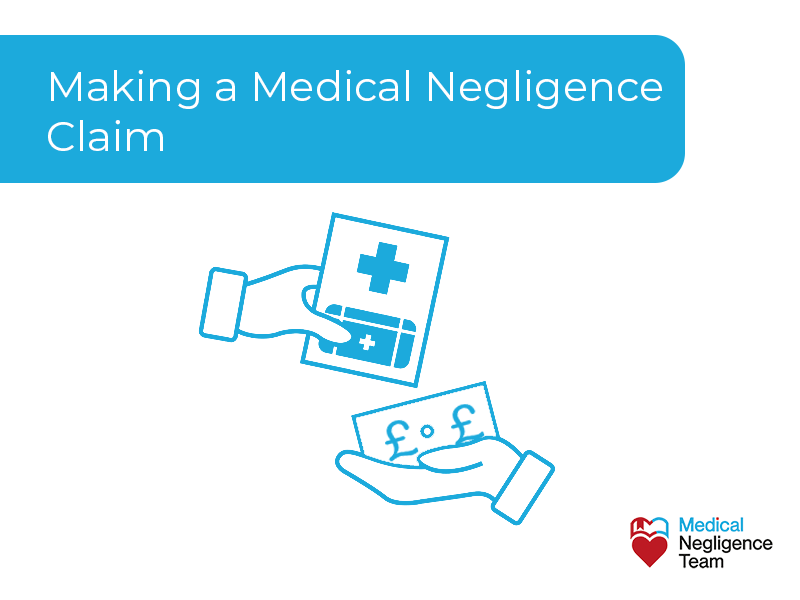
100% Compensation
If your claim wins we will pay you 100% of the compensation with no deductions. You get 100% every penny with no deductions. New claims only with no previous solicitors.
No Win, No Fee
If your claim wins our costs are paid by the negligent party so you get paid 100% of the compensation recovered.
Our Expert Team
Our Dr Anthony Barton edits the leading book “Clinical Negligence”. Anthony and his wife Penelope (a GP) have a combined sixty years of medical and legal experience.
Using a No Win No Fee solicitor
Using a No Win No Fee solicitor is the only way to a successful Group B Streptococcus negligence compensation claim. Your No Win No Fee medical negligence solicitor will not charge you for a claim you do not win.
Always have a fee agreement in place before engaging a medical negligence solicitor. If they start talking of a ‘win fee’ or a ‘success fee,’ you should walk away. The negligent party insurers should pay all fees.
The medical negligence solicitor should also operate a 100% Compensation Guarantee scheme. When you win the case, all the money awarded should go to you, not the solicitor.
You are the one who suffered the Group B Streptococcus negligence, and you deserve the compensation to get your life back to normal.
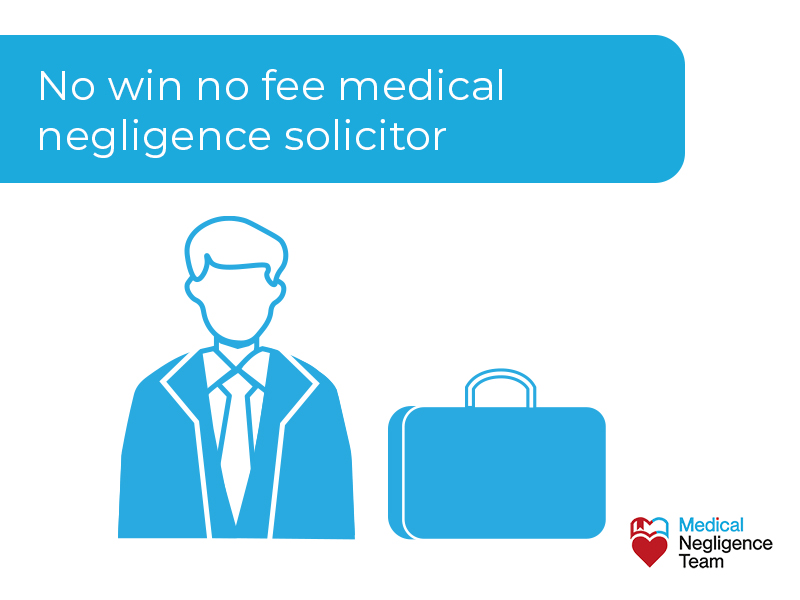
How long do I have to make a claim for Group B Streptococcus negligence?
You have three years to make a claim for Group B Streptococcus negligence. All medical negligence claims are subject to limitation periods.
For example, in England and Wales, medical negligence claims must generally be brought and court proceedings issued within three years of the injury or three years of knowledge of the facts giving rise to the Group B Streptococcus negligence claim.
If someone has passed away, it is the date of death if the limitation period has not expired at the date of death.
Children not under a disability typically have until they reach 21 to start a Group B Streptococcus negligence claim or court proceedings.
Persons with a disability, who lack capacity, are not subject to any limitation period.
Can I make a medical negligence claim against the NHS?
Yes, you can make a medical negligence claim against the NHS. Suing the NHS for negligence is not unusual. People sue the NHS for compensation for medical negligence and receive the money they deserve for the negligent treatment.
There are between 8,000 and 10,000 successful medical negligence claims against the NHS each year—amounts in compensation claims awarded against the NHS range from £1000 to over £10 million.
The amount of compensation you receive covers minor injuries such as scarring to serious life-threatening negligence, which leaves you with long-term care needs.
We trust in and use the NHS daily and do not expect negligence. It happens, though, and the NHS has a dedicated team to handle medical negligence compensation claims, called NHS resolution.
NHS Resolution has a responsibility to treat patients who seek compensation fairly. Patients pay for the NHS through their taxes, and for that they deserve respect and the best medical treatment.
Contact The Medical Negligence Team
Contact the Medical Negligence Team today to discuss your Group B Streptococcus negligence claim for compensation. We have both the legal and medical experts to guide you along the steps to a successful medical negligence claim for compensation.
At the Medical Negligence Team, we fight every compensation claim on a No Win No Fee basis. You will not be out of pocket for an unsuccessful claim.
We have a very high success rate and a reputation for a speedy and successful resolution to all medical negligence cases.
Our 100% Compensation Guarantee puts all the money you win into your pocket. You or your loved one suffered Group B Streptococcus negligence and deserve every penny of the compensation claim.
Contact us at the Medical Negligence Team for all your medical negligence needs.


